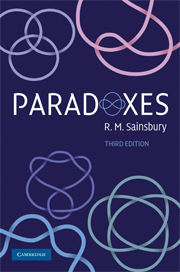Book contents
- Frontmatter
- Contents
- Foreword to third edition
- Introduction
- 1 Zeno's paradoxes: space, time, and motion
- 2 Moral paradoxes
- 3 Vagueness: the paradox of the heap
- 4 Acting rationally
- 5 Believing rationally
- 6 Classes and truth
- 7 Are any contradictions acceptable?
- Appendix I Some more paradoxes
- Appendix II Remarks on some text questions and appended paradoxes
- Bibliography
- Index
6 - Classes and truth
Published online by Cambridge University Press: 05 June 2012
- Frontmatter
- Contents
- Foreword to third edition
- Introduction
- 1 Zeno's paradoxes: space, time, and motion
- 2 Moral paradoxes
- 3 Vagueness: the paradox of the heap
- 4 Acting rationally
- 5 Believing rationally
- 6 Classes and truth
- 7 Are any contradictions acceptable?
- Appendix I Some more paradoxes
- Appendix II Remarks on some text questions and appended paradoxes
- Bibliography
- Index
Summary
The paradoxes to be discussed in this chapter are probably the hardest of all, but also the most fecund. Russell's paradox about classes, which he discovered in 1901, led to an enormous amount of work in the foundations of mathematics. Russell thought that this paradox was of a kind with the paradox of the Liar, which in its simplest form consists in the assertion “I am now (hereby!) lying.” The Liar paradox has been of the utmost importance in theories of truth. Everything to do with these paradoxes is highly controversial, including whether Russell was right in thinking that his paradox about classes and the Liar paradox spring from the same source (see section 6.9).
Russell's paradox
If Socrates is a man, then he is a member of the class of men. If he is a member of the class of men, then he is a man. Can classes be members of classes? The answer would seem to be Yes. The class of men has more than 100 members, so the class of men is a member of the class of classes with more than 100 members. By contrast, the class of the Muses does not belong to the class of classes having more than 100 members, for tradition has it that the class of the Muses has just nine members.
- Type
- Chapter
- Information
- Paradoxes , pp. 123 - 149Publisher: Cambridge University PressPrint publication year: 2009



